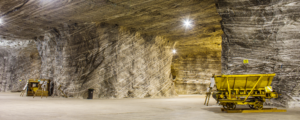Mesothelioma / Occupations / Mining
Asbestos in the Mining Industry
In Summary: For most of history, mining has been one of the most dangerous occupations in the world. Exposure to airborne carcinogens in mines has resulted in thousands of chronic respiratory diseases (such as asbestos-linked mesothelioma). Even miners who don’t work in asbestos mines could be exposed to dangerous levels of the toxin along with dozens of other cancer-causing agents. Victims of occupational exposure in the mining industry may be eligible to seek financial compensation with the help of an attorney.
Get Free Mesothelioma Guide
Health Risks in the Mining Industry
Mining is one of the oldest occupations in human civilizations and has long remained one of the riskiest to its professionals. The mining industry involves a variety of jobs in extracting coal, metal ore, and nonmetallic materials. Many of the resources being mined are toxic to humans in high airborne concentrations without proper respiratory protection.
Coal dust, crushed silica, diesel exhaust, and asbestos veins running through talc deposits are some of the materials responsible for many of the long-term breathing problems miners experience. Subsequently, breathing impairment and respiratory system diseases are considered major health risks for anyone who has worked in the mining industry. According to the Centers for Disease Control, in as few as five years, miners could increase their risk of dying from lung cancer.
Unfortunately, miners with the longest tenures are most at risk of being diagnosed with a work-related lung problem. In the 1970s, a third of miners studied with over 25 years of experience was diagnosed with a type of occupational lung disease. Today, about 10 percent of miners monitored by the Coal Workers’ Health Surveillance Program (with more than 25 years’ experience) have exhibited diagnosable abnormalities on chest X-rays.
How Are Miners Exposed to Toxins?
In a report by the Industrial Disease Standards Panel (IDSP), over 66 chemicals were identified in miners’ work-related injuries and illnesses between 1999 and 2006. With over 329,000 men and women employed in the mining industry in the U.S. in 2006, the potential for toxic exposure and long-term health problems is high – and is typically even higher for miners employed before this time.
Usually, miners are exposed to cancer-causing materials through three routes: inhaling particles, swallowing particles that land on food or cigarettes, and through direct contact with the skin or eyes. Due to the confined spaces with poor ventilation most miners work in, inhalation of toxic particles and pulverized, airborne dust is the most common method of hazardous exposure. However, diseases like mesothelioma have resulted from miners swallowing asbestos particles that landed on food, utensils, and cigarettes or from touching their mouths without washing their hands after working.
Health risks in the mining industry caused by exposure include the following materials:
- Arsenic
- Asbestos
- Cadmium
- Coal dust
- Cobalt
- Cyanide
- Diesel exhaust
- Lead
- Manganese
- Mercury
- Nickel
- Platinum
- Radon
- Silica
- Sulfur dioxide
- Xanthates
Additionally, family members who live with miners are at risk of developing a mining-caused health problem through secondary exposure. Asbestos and lead dust, for instance, can travel home on the skin and clothes of miners. If not carefully handled and washed, these toxins can be transferred to family members through touch or inhaled through the air when the miner comes home.
Most with mesothelioma are too sick to work.
Call us for a case evaluation and discover other compensation options that may help pay for treatment, sick leave, and other necessities.
833-997-1947
Types of Long-term Health Problems
In a single career spanning more than 20 years in mining, a single worker could be exposed to a wide variety of carcinogens. Consequently, there are numerous potential health complications. The most common health problems among miners are respiratory system disorders, including:
- Asbestosis
- Asthma
- Byssinosis
- Chronic obstructive pulmonary disease (COPD)
- Coal-workers pneumoconiosis
- Dust diseases of the lungs
- Lung cancer
- Mesothelioma
- Occupational lung disease
- Pleural effusions
- Pleural plaques
- Silicosis
Many of the above health complications take decades to develop before noticeable or serious symptoms arise. Early symptoms of occupational lung disease include:
- Cough that lasts at least eight weeks
- Worsening cough
- Trouble breathing
- Continuous chest pain
- Unexplained weight loss
Studies of long-term health issues among miners also found a risk for some occupational cardiovascular diseases, reproductive disorders, and neurotoxic disorders.
Compensation for Victims
When a miner is injured or diagnosed with a work-related illness during their employment, workers’ compensation may cover the cost of medical bills and missed wages. However, this form of compensation removes the ability of workers to sue the company for negligence and seek a settlement.
Certain lawsuits may be able to provide miners and their families with additional forms of compensation for mining-caused diagnoses. A qualified mesothelioma attorney can help you prepare a legal case.
Mesothelioma Support Team
Mesothelioma Hub is dedicated to helping you find information, support, and advice. Reach out any time!
